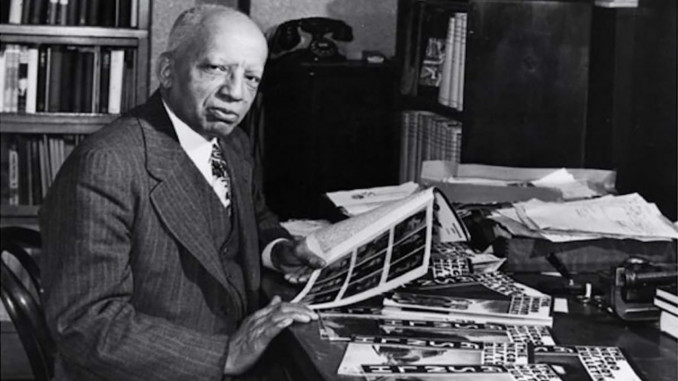
There has never been a time since the first slave ship docked in Jamestown, Virginia, in 1619 that Black people have not struggled against oppression both as individuals and as a group. The racist rulers of the United States knew that keeping Black people down required a sustained effort to deny and distort the history of their struggles.
In 1916, a handful of Black historians, led by Carter Woodson, launched a magazine called “The Journal of Negro History” to push back against what they called “The Mis-Education of the Negro”. The Journal appeared quarterly, never missing an issue despite chronic financial difficulties, especially during the Great Depression in the 1930s. Black History month is the product of their efforts.
One focus of these historians was the experience of Black People in the years following the Civil War. With the passage of the Fifteenth Amendment in 1868, Black people won the right to vote. In the Southern States where most Black People lived, they achieved some political power. In parts of the South, Black people won elections as sheriffs, congressmen and numerous representatives in state legislatures. They used this power to establish the first public schools in the South, instituting taxes on plantation owners, and establishing the first publicly supported hospitals. Black political leaders did what they could to assist Black farmers to buy land at reduced prices and to bargain for fair labor contracts. In 1877, these efforts to establish Black equality lost the support of the U.S. government. White plantation owners and business men took back political power in the South with the violent help of the KKK.
To justify the violence which established white supremacy, influential white politicians, newspaper owners, and clergymen spread the myth that the interracial governments that black votes put into office were all corrupt, had bankrupted the states they governed, and encouraged Black people to violate the rights of whites. These lies were presented as evidence that Black people were an inferior “race”, not deserving any share of political power. The dominance of white supremacist ideology not only biased whites against Blacks but also tended to undermine Black confidence that they could successfully resist their oppression.
The Journal of Negro History systematically refuted the lies promoted by white supremacist historians. The Journal did not limit itself to issues in U.S. history, it pioneered recognition of the accomplishments of Africans in the ancient world, including how Egyptian thinkers laid much of the intellectual foundation for Greek civilization. To increase the impact of their work, Woodson and his colleagues mailed weekly excerpts from the Journal to Black teachers in segregated school systems. Beginning in 1926 he organized “Negro History Week” to promote the recognition of Black accomplishments in spite of oppression.
During the Civil Rights and Black Power movements, Black people were not only making history but demanding to learn the history of past generations. Under this pressure, Colleges and Universities established African-American Studies majors and History departments. Black History Week evolved into Black History Month and was officially recognized by the U.S. government in 1976. The Journal of Negro History became the Journal of African American History in 2002.
Today, in the U.S., the study of Black history is once again under attack. Reactionary politicians pass laws to discourage both Blacks and whites from learning about the history of racial oppression, and particularly how it was instrumental in building the great wealth on which U.S. power is based. The lives and work of leaders of the struggles in the 1960s are either ignored or tokenized as in the case of Martin Luther King. It is up to a new generation of Black militants to recover, update, and learn the lessons of Black History. In doing so, they will be following the path pioneered by Carter Woodson and the Journal of Negro History.




